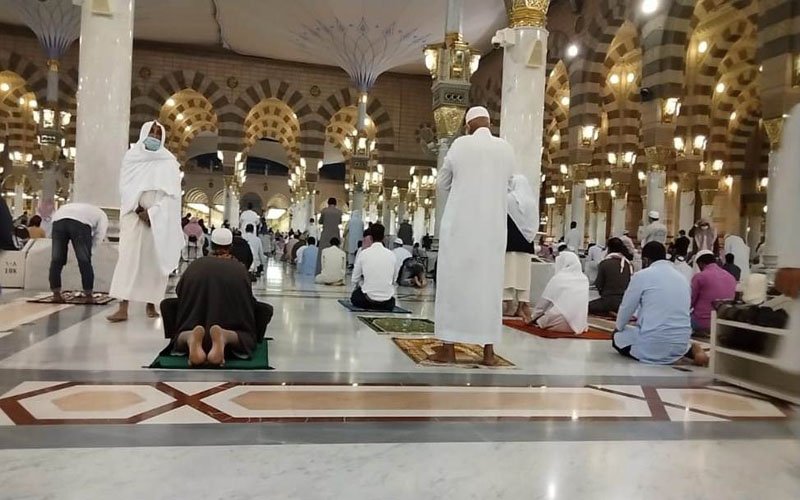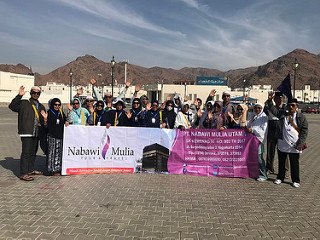Hajj is one of the five pillars of Islam that must be fulfilled by every Muslim who has met the requirements, namely having physical and financial capability. This worship not only has a very high spiritual value, but also has a variety of pillars and procedures that must be implemented in accordance with the provisions. One of the practices that is often done by pilgrims is to carry out Arbain Prayers. Arbain Prayer is a sunnah worship which is carried out for eight consecutive days at the Nabawi Mosque, Medina, namely by performing 40 prayer times in congregation without interruption.
However, in practice the implementation of the pilgrimage, not all pilgrims have the same physical condition. Especially for the elderly, sometimes declining health conditions or physical limitations are a challenge in carrying out the entire series of worship. One of the things that is often the question is whether the inability of an elderly to carry out Arbain prayer can affect the validity of the pilgrimage that is carried out?
To answer this question, it must be understood in advance that the pilgrimage consists of a number of main pillars that must be done by each congregation. Pillars including ihram, tawaf, sa’i, wukuf in Arafat, and throw jumrah, namely throwing aqabah, ula, and wustle in Mina. All of these pillars are obligations that cannot be abandoned. On the other hand, Arbain’s prayer is included in the category of very organized sunnah practices, but does not include pillars or legal conditions of pilgrimage.
Therefore, if an elderly are unable to perform Arbain prayers because of his health condition that is not possible or physical limitations possessed, then the pilgrimage that he runs remains valid. They can still carry out other main pillars which are an absolute requirement in the pilgrimage. Thus, the absence in the implementation of the Arbain prayer does not abort or cancel the validity of his pilgrimage.
This principle is in line with the teachings in Islam, where Allah Subhanahu wa Ta’ala does not burden His servants beyond the limits of their abilities. Islam is a religion that is very concerned about human conditions and limitations. Therefore, for the elderly who have difficulty in carrying out certain worship such as Arbain Prayers, the opportunity is still open to get the reward and blessing of the Hajj as a whole, as long as they carry out pillars and other compulsory hajj according to their abilities.
In addition, in the teachings of Islam also the concept of sharia maqasid is known, namely the main objectives of Islamic law which includes protection of the soul, reason, religion, property, and descendants. In the context of the pilgrimage, maintaining the health of pilgrims, especially the elderly, is an important part of the implementation of the maqasid. Therefore, the comfort and safety of the elderly must be the main consideration in the implementation of their worship.
Although not mandatory, the elderly who cannot carry out the Arbain prayer are still recommended to replace it with other practices that are in accordance with their physical abilities. They can multiply reading the Qur’an, dhikr, or offer prayers as a form of worship and self-approach to Allah Subhanahu wa Ta’ala. The spirit and sincere intention in carrying out worship are very important, because the value of worship in Islam is not merely determined by its form, but also by sincerity and sincerity of intention.
In this situation, the role of family and companions is very large in helping the elderly perform the pilgrimage. Moral support, attention to health conditions, as well as active communication with medical officers and the Hajj health team can help ensure that the elderly remain safe and comfortable during worship.
In closing, it is necessary to emphasize that the inability of an elderly in carrying out the Arbain prayer does not make his pilgrimage unauthorized. As long as the harmony and other Hajj obligations are carried out with sincere intentions and the best abilities, the pilgrimage is still accepted by Allah Subhanahu wa Ta’ala. The most important thing is sincerity, sincerity in carrying out God’s commands, and paying attention to physical and health conditions while in the Holy Land.
Game Center
Game News
Review Film
Rumus Matematika
Anime Batch
Berita Terkini
Berita Terkini
Berita Terkini
Berita Terkini
review anime



